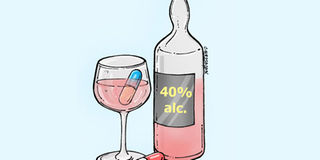Alcohol and medication: the combination that may drive you to an early grave

As I was travelling from the village a few months ago, I made a stop at Rwashamaire Town Council in Ntungamo to meet colleagues who were merry-making at one of the drinking joints.
As I sat with them, a shivering gentleman moved in, and ordered for a glass of crude waragi. As he was getting served, he got tablets from his pocket and swallowed them with the waragi, to the dismay of some of the drinking crew members.
Disturbed by this, a friend got concerned and asked him why he was “killing” himself.
He laughed it off, saying: “Youngman, I have been doing this kind of medication for over 10 years.”
He added: “I was also advised by a friend who used to treat malaria when sick. He would buy chroloquine and aspirin and swallow the tablets using alcohol (waragi) and would get healed.
“Whenever I fall sick with malaria, I swallow tablets using waragi, go home cover myself, sweat profusely and by the time I get out of bed, I am already okay.”
This man is not the only one with this perception. Allan Kansiime (not real name), a resident of Andrews, Kakiika in Mbarara, is also into the habit of taking drugs with alcohol. Unfortunately for him, he is on Anti-retroviral drugs which he has to take regularly. This means he mixes alcohol with drugs on a regular basis.
While he is supposed to take his drugs (ARVs) at 7am and 7pm as prescribed by his doctor, he is always drunk by 7pm. Sadly, he still takes the drugs with alcohol.
Why you should not take drugs with alcohol
According to www.drinkaware.com.uk, there are two main reasons why doctors advise patients against taking drugs with alcohol.
“First, because alcohol is a depressant, it affects the way your brain works, numbing your senses so they don’t operate properly.
“Some types of medication also affect the way your brain works, and if you’re drinking alcohol, there will be a conflict. Alcohol will increase the sedative effects of both, causing sleepiness and dizziness.
It could also change the way the brain responds to the medication, making it less effective.”
If you’re taking a sedative drug such as diazepam or valium, or any other drug that can make you drowsy, then you drink alcohol, your reaction times could decrease and you’ll get tired faster. If you’re driving or operating machinery, this can be extremely dangerous.
“Secondly, alcohol can affect the way drugs are absorbed by the body and broken down in the liver,” www.drinkaware.com.uk says.
The site adds: “If you drink alcohol regularly and especially if you drink excessive amounts, your liver produces more enzymes so that it can get rid of the alcohol more quickly. Those same enzymes might break down the medication you are taking so it no longer has the same effect. An example of this is medications for epilepsy”.
Experts take
Dr Julius Mwiine of MM Medical Centre Mbarara, says mixing alcohol with drugs even after hours of medication is extremely dangerous and at most should be avoided because it affects your mental and physical health. He says mixing alcohol with medications increases the risk of heart problems, difficulties in breathing, fainting and headaches and can make the drugs toxic to your body. Dr Mwiine says in the case of people on long term drugs, such as HIV medication, it is extremely dangerous to mix alcohol with drugs as if affects the liver.
“The liver is responsible for breaking down and getting rid of waste products from many these medications. When you are taking HIV treatment drugs, it is important that your liver works as well as possible for these drugs to be effective,’’ Dr Mwiine says.
He also says too much alcohol can weaken your immune system and that a weaker immune system also increases the chance that you will experience more side effects from your HIV medications and fighting HIV-related infections.
So, before you even think of gulping down that bottle of liquor with your drugs, think about the consequence the combination will have on your health.




